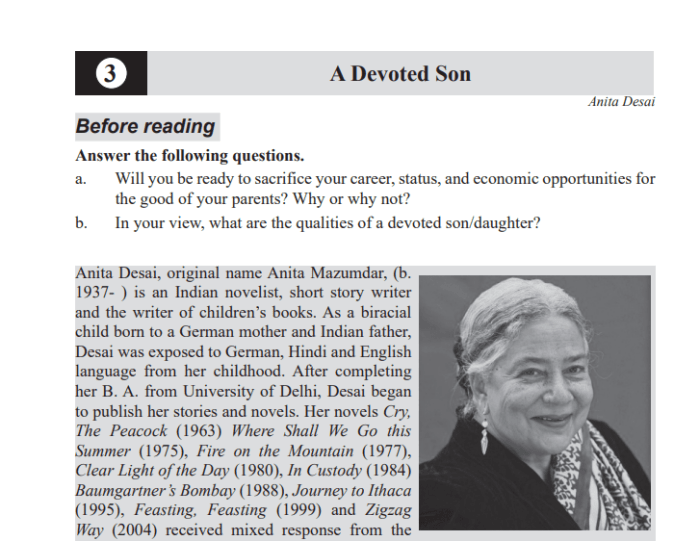In desai’s story a devoted son – In Desai’s story, “A Devoted Son,” we delve into the extraordinary tale of a son whose unwavering devotion to his mother defies societal norms and explores the complexities of love, sacrifice, and filial piety.
Desai paints a vivid portrait of the son’s unwavering love and commitment, showcasing the profound impact of cultural and traditional values on his actions and beliefs.
Desai’s Depiction of a Devoted Son

Anita Desai’s portrayal of the son in her story highlights the profound depth of his devotion to his mother. Through intricate descriptions of his actions, emotions, and unwavering commitment, Desai crafts a poignant exploration of the enduring bonds between a mother and her child.
Unwavering Care and Support
- The son selflessly attends to his mother’s every need, anticipating her desires and providing constant support.
- He sacrifices his own comfort and well-being to ensure her happiness and well-being, showcasing his deep sense of responsibility and love.
- Despite the challenges and demands of caregiving, the son remains unwavering in his dedication, driven by an unyielding sense of duty.
The Son’s Relationship with his Mother: In Desai’s Story A Devoted Son

The son’s relationship with his mother is a complex and multifaceted one. On the one hand, there is a deep love and affection between them. The son is devoted to his mother and cares for her deeply. He is always willing to help her out, and he always puts her needs before his own.
On the other hand, there is also a power dynamic between them. The mother is the dominant figure in the relationship, and she often makes decisions for her son without consulting him. This can lead to conflict between them, as the son sometimes feels like he is not being heard.Despite
these conflicts, the son’s devotion to his mother never wavers. He understands that she is doing her best, and he loves her unconditionally. Their relationship is a testament to the power of love and the importance of family.
Emotional Bonds
The emotional bond between the son and his mother is very strong. They share a deep love and affection for each other. The son is always there for his mother, and he always puts her needs before his own. He is also very protective of her, and he always tries to keep her safe.
In Desai’s story “A Devoted Son,” the protagonist’s unwavering dedication to his mother showcases the profound bond between them. To delve deeper into the intricacies of human relationships, you can explore the Art Praxis 5135 Practice Test . By examining the themes and characters in Desai’s work, you can gain valuable insights into the complexities of familial love and the sacrifices made in its name.
The mother, in turn, is very proud of her son. She loves him unconditionally, and she always wants what is best for him.
Power Dynamics
The power dynamics between the son and his mother are complex. The mother is the dominant figure in the relationship, and she often makes decisions for her son without consulting him. This can lead to conflict between them, as the son sometimes feels like he is not being heard.
However, the son also understands that his mother is doing her best, and he always tries to respect her wishes.
Conflicts, In desai’s story a devoted son
Despite their strong bond, the son and his mother do have conflicts from time to time. These conflicts are often caused by the power dynamics between them. The son sometimes feels like he is not being heard, and he can also be frustrated by his mother’s overprotectiveness.
However, these conflicts are usually resolved quickly, and they do not damage the overall relationship between the son and his mother.
The Role of Culture and Tradition

In Desai’s story, the son’s devotion to his mother is deeply rooted in the cultural and traditional values of his society. The influence of these external factors shapes his behavior, beliefs, and unwavering loyalty.
Societal Expectations
- The son’s society places a high value on filial piety, which emphasizes respect, obedience, and devotion to one’s parents.
- As the eldest son, he is expected to be the primary caregiver for his aging mother, ensuring her well-being and comfort.
- Societal norms dictate that children are responsible for their parents’ happiness and well-being, even if it requires personal sacrifice.
Family Norms
- Within the son’s family, there is a strong tradition of close-knit relationships and interdependence.
- The mother has always been the central figure in the family, providing love, guidance, and support.
- The son’s unwavering loyalty stems from a deep sense of gratitude and obligation towards his mother, who has made countless sacrifices for him.
Contribution to the Son’s Devotion
These cultural and traditional factors contribute significantly to the son’s unwavering devotion to his mother. They create a framework of expectations and norms that guide his behavior and reinforce his sense of duty and responsibility. As a result, the son feels a deep sense of obligation to care for his mother and ensure her happiness, regardless of the personal sacrifices involved.
The Son’s Inner Conflicts

The son in Desai’s story grapples with a multitude of inner conflicts that stem from his unwavering devotion to his mother. These conflicts arise from the tension between his personal aspirations and his perceived obligations towards her.
One of the most prominent conflicts is the son’s desire for personal freedom and independence. He longs to pursue his own interests and ambitions, but feels constrained by his sense of duty to care for his mother. This conflict is particularly evident in his interactions with his friends, who often encourage him to break free from his familial responsibilities.
The Son’s Obligations
- The son feels a deep sense of obligation to provide for his mother’s physical and emotional well-being. He believes that it is his duty to sacrifice his own happiness for her sake.
- This sense of obligation is reinforced by cultural and societal norms that emphasize the importance of filial piety. The son feels pressure to conform to these expectations and avoid any actions that might be perceived as disrespectful or selfish.
The son’s inner conflicts contribute significantly to the development of his character. They force him to confront his own values and priorities, and to question the nature of his relationship with his mother. Ultimately, these conflicts lead him to a greater understanding of himself and his place in the world.
The Significance of the Son’s Devotion

The son’s unwavering devotion to his mother holds immense symbolic significance. It transcends the confines of their personal relationship, reflecting profound themes of love, sacrifice, and filial piety.
The son’s love for his mother is not merely a familial bond; it’s a profound and selfless expression of affection. He prioritizes her well-being above his own, sacrificing his personal desires and aspirations to ensure her comfort and happiness.
Sacrifice and Filial Piety
The son’s devotion embodies the concept of filial piety, a cornerstone of many cultures. It demonstrates his unwavering commitment to honoring and respecting his mother, regardless of her flaws or shortcomings. His actions serve as a testament to the deep-seated cultural values that shape his behavior.
Universal Resonance
The son’s story resonates with readers on a universal level because it taps into fundamental human emotions. His unwavering devotion to his mother, despite the challenges and sacrifices involved, is a reminder of the enduring power of love and the importance of familial bonds.
It evokes a sense of empathy and admiration, transcending cultural and geographical boundaries.
Question & Answer Hub
What is the central theme of Desai’s story?
The central theme of Desai’s story is the unwavering devotion of a son to his mother, exploring the complexities of love, sacrifice, and filial piety.
How does Desai portray the son’s relationship with his mother?
Desai portrays the son’s relationship with his mother as complex and multifaceted, shaped by power dynamics, emotional bonds, and conflicts.
What is the significance of cultural and traditional values in the story?
Cultural and traditional values play a significant role in shaping the son’s behavior and beliefs, influencing his unwavering loyalty to his mother.
